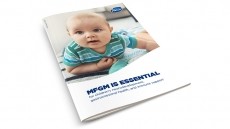'More than nutrition': BfR cites additional breastfeeding benefits for mothers

These benefits, along with the more well-established physical changes are outlined in a special issue of the public health journal Bundesgesundheitsblatt, in which a scientific perspective is taken to validate the positive effects of breastfeeding.
“Science is always faced with a great challenge when it comes to the question of what different effects breastfeeding has for children and mothers,“ commented Drs Klaus Abraham, head of unit risks of subpopulations and human studies at the German Federal Institute for Risk Assessment (BfR) and Suzan Fiack, head of the BfR’s unit press and public relations.
In an editorial featured in the publication they added, “Controlled studies on this topic are difficult to implement, and there is often a lack of long-term data.
“Science and health care today agree on breastfeeding as an irreplaceable value.“
No nationwide breastfeeding coverage
Current German provisions do not extend to a full-coverage national breastfeeding monitoring programme.
Based on available data, it is still not possible to determine the frequency and duration of breastfeeding according to standardised scientific criteria.
The special issue also features a paper discussing the psychological effects of breastfeeding on children and mothers.
Here, Drs Kathleen Krol and Tobias Grossmann document their observations in children that associate breastfeeding with improved cognitive performance and socio-affective responding.
Improved cognitive performance in children is likely linked to the fatty acids (i.e. long-chain polyunsaturated fatty acids (LC-PUFAs)) contained in breastmilk and their potential beneficial effect on brain development during infancy, especially concerning the growth of white matter tracts (myelination).
Heightened socio-affective responding seen in breastfed children is possibly connected to the stimulation of the oxytocin system and oxytocin’s known role in promoting positive affect and approach behaviors, while reducing stress and avoidance behavior.
The paper also highlights the effect breastfeeding has on mothers, with the authors commenting that the process “significantly reduces physiological and subjective stress, facilitates positive affect, and improves maternal sensitivity and care“.
“Again, the oxytocin system likely plays an important role in explaining the effects on maternal psychology and behavior.“
Caffeine and infant formula
Of particular interest is a review looking into the effect foreign substances such caffeine and alternatives such as infant formula can have on the risks to infants' health.
Researchers from the Charité in Berlin and the BfR believe the risks associated with breast-milk consumption in exclusively breast-fed infants are generally considered to be low and therefore no reason for prolonged breastfeeding or weaning.
“The positive effects of breastfeeding on child (and mother) are well documented,“ the researchers concluded.
“In individual cases, however, for example due to the necessary intake of certain medications or due to an existing infectious disease, a weaning in the interest of the child's health is recommended.“
“In highly developed countries, it is basically a low-risk diet that does not lead to individually identifiable deficits compared to breastfed children. The prerequisite is that no mistakes are made during preparation and storage (clean water, correctly used quantities, correct temperatures during mixing and drinking),” the paper added.
Source: Federal Health Gazette - Health Research - Health Protection
Published online ahead of print: doi.org/10.1007/s00103-018-2787-y
“Breastfeeding in Germany.”
Authors: Klaus Abraham and Suzan Fiack














